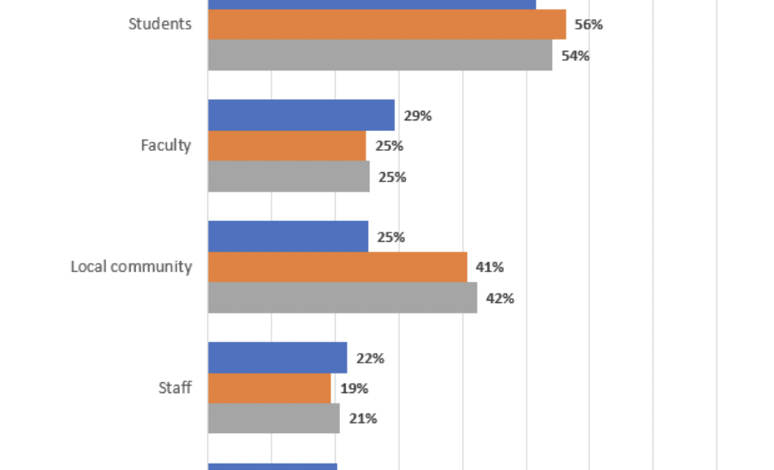
Rider News obtains campus climate survey
THE Rider Diversity Equity and Inclusion (DEI) 2022 campus climate survey revealed a multitude of places where the university can improve in terms of DEI, but also where its strengths are in comparison to other higher education institutions.
In all, 18% of Rider’s students and employees reported having experienced discrimination or harassment, according to survey data, equivalent to other four-year private universities. Of those, 52% indicated it occurred within the last year, according to the survey.
The survey, which was emailed to Rider students, faculty, staff, and administrators in February and March 2022, asked questions pertaining to the campus’ environment, how often those who took the survey have experienced discrimination and harassment and perceptions of Rider’s commitment to DEI. Of the 1,034 who participated in the survey, 334 were Rider employees and 700 were students.
Demographics for the surveyees included race/ethnicity, gender identity, sexual orientation, political views, disability status and religious affiliation in order to see where the university could improve in terms of providing a quality campus climate.
Chief Diversity Officer Barbara Lawrence, the main official in charge of the Rider survey, did not send the complete results to The Rider News after multiple requests since April 3, and did not make herself available for an interview regarding the survey findings.
The results, which were released to The Rider News by Associate Vice President for University Marketing and Communications Kristine Brown on April 25, showed where Rider places in terms of DEI in comparison to other four-year private and public higher education institutions that also participated in the survey. More than a year after Rider’s survey, the results have still not been released to the university community as a whole, differing from many other universities who featured results on their websites. In an article published by The Rider News on Feb. 23, 2022, Lawrence had promised that “analyses of the survey’s results will be completed by the spring and then shared with the community.”
The survey was a mandated part of Rider’s Inclusive Excellence Plan, and in urging the community to participate last spring, Rider President Gregory Dell’Omo said that the survey would provide valuable data in assessing campus inclusivity.
One of Rider’s most notable findings was that faculty, staff and administrators were more frequently identified as the source of insensitive and disparaging remarks in comparison to other institutions.
Survey results revealed that 29% of respondents reported that faculty were “sometimes, often or very often” the source of insensitive and disparaging remarks, which is 4% higher than other participating institutions.
Administrators came in as the source at 20%, a number that is 5% more, and staff were 22% reported as the source of remarks, only a single percent more than other institutions and 3% more than other four-year private institutions.
Faculty and students are more frequently identified as sources of discrimination and harassment, with faculty reporting at 46%, which is 6% more than other participating institutions, and students at 64%, just 3% more.
However, no groups reported discrimination and harassment or insensitive and disparaging remarks at rates that are substantially worse than other institutions, according to the survey results.
Naa’san Carr, junior political science major and newly appointed Student Government Association president, ran most of his campaign on kickstarting DEI initiatives campus-wide. Carr, who viewed the results during a SGA meeting, said that he hopes to continue to push DEI next year in his presidency through different training, trying to initiate an Rider NAACP chapter, and more.
“I think the campus climate is getting better, from what I have experienced coming here in 2020,” said Carr. “We’re being more aware, and we’re doing things better, but it doesn’t mean that work still doesn’t need to be done.”
In terms of strength for the university, the ratings of institutional support for DEI initiatives are more positive than at other institutions. Student groups also reported satisfaction with campus climate as comparable to or slightly higher than students at other institutions that participated in the survey.
The results for the survey concluded that as a whole, Rider’s campus climate satisfaction does not differ significantly from that of other institutions, and almost all student groups reported satisfaction comparable to or slightly higher than students in other institutions.
On behalf of the university, Brown said, “Rider’s commitment to DEI is strong, and data such as that compiled through a climate survey helps to guide our strategies moving forward.”


